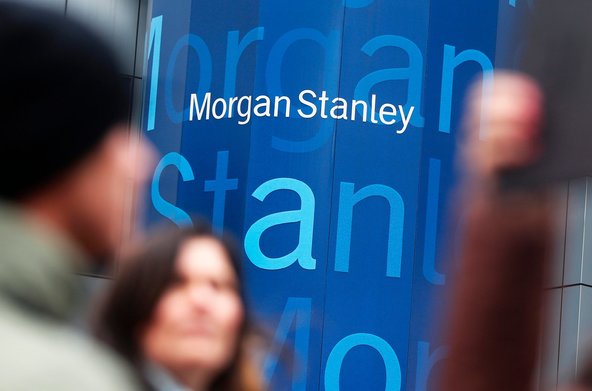 Shannon Stapleton/ReutersThe headquarters of Morgan Stanley in New York.
Shannon Stapleton/ReutersThe headquarters of Morgan Stanley in New York.
8:40 p.m. | Updated
Morgan Stanley has taken aggressive action to bolster profit. Over the last year, the Wall Street bank has cut thousands of employees, sold costly assets and retooled major businesses.
Those efforts worked. In the fourth quarter, Morgan Stanley reported earnings of $481 million, in contrast to a loss of $275 million in 2011. Profit was equally strong for the year.
But the path to future growth is less clear. While the financial firm can find other ways to cut costs, its core operations face significant challenges, from both internal and external forces. Reflecting those issues, revenue was flat last year, excluding charges related to its debt.
“They are doing everything they can to boost returns,” said Glenn Schorr, an analyst at the Japanese bank Nomura. “But given the environment and the state of their franchise, they can only do so much.”
Investors are assessing the progress versus the prospects.
After Morgan Stanley beat analysts’ expectations, the bank’s shares increased nearly 8 percent, to close at $22.38 on Friday. Morgan Stanley’s stock is up nearly 50 percent since early 2012.
“The company has been steadily chipping away at areas of investor concern, and has shown evidence of that progress,” Roger Freeman, a Barclays analyst, wrote in a note to investors.
Still, investors don’t value the investment bank as highly as some of its peers.
Morgan Stanley is trading at approximately 70 percent of its book value, a crucial financial measure that refers to the liquidation value of a company’s assets if it were forced to sell everything. Goldman, in contrast, is trading at book value.
More than four years after the financial crisis, Morgan Stanley has emerged as a much stronger, albeit smaller, bank.
After getting badly bruised during the crisis, Morgan Stanley, under the leadership of James P. Gorman, the chief executive, has moved to remake itself. He has diversified operations, emphasizing less risky businesses like wealth management.
That group was a particular bright spot. In the latest quarter, wealth management, with its 16,780 financial advisers, posted decent revenue growth. Pretax profit margin rose to 17 percent, up from 7 percent a year ago. That trumped the firm’s internal goals of 15 percent.
Investment banking, too, showed signs of strength. The group posted revenue of $1.23 billion in the fourth quarter, up 26 percent from the previous year.
The bank has also cut expenses significantly to help drive profitability. In 2012, Morgan Stanley reduced its head count by 7 percent, to 57,061 employees. It laid off 1,600 people this month.
The firm has also been bringing its pay levels down modestly. The firm’s compensation ratio, excluding certain charges, came in at roughly 51 percent, down from 57 percent a year ago.
Such efforts will most likely continue. On Friday, the bank said it might cut expenses by as much as $1.6 billion over the next two years.
Mr. Gorman called this quarter “pivotal,” on Friday. “I am confident we are on the path to increasing shareholder value that will be evident regardless of the macro environment,” he said in a statement.
Even so, the latest results underscored the growing gap between the bank and its rivals.
Revenue was flat for the quarter at Morgan Stanley, while it increased by 19 percent at Goldman Sachs during the same period. Excluding charges related to its debt, Morgan Stanley’s return on equity, a measure of profitability, was 5 percent. That compares with 10.7 percent at Goldman. To simply cover its debt expenses and other capital costs, Morgan Stanley needs to achieve a return on equity closer to 10 percent.
The firm’s problem child is the fixed income department.
Fourth-quarter revenue from fixed income sales and trading, headed by Ken deRegt, was $811 million, excluding the charges related to the firm’s debt. This was well below analysts’ forecasts. The bank was hurt by poor results in commodities trading, Mr. Gorman said in an interview on CNBC. He said it was a “terrible quarter,” citing factors like Hurricane Sandy, adding that it was one of the worst for the commodities business since 1995.
Despite its successes, Morgan Stanley faces a tough road.
The bank, which has had its credit rating cut deeper than its rivals, is also adjusting to a new regulatory environment. It now has to put up more capital against its operations, forcing the bank to leave certain businesses, reducing profitability.
Morgan Stanley is also trying to build market share in less-capital-intensive businesses like interest rates trading. But it is a highly competitive area, with lower margins.
“They have made some clear progress, but still have their work cut out for them in fixed income,” said Mr. Schorr of Nomura.
Article source: http://dealbook.nytimes.com/2013/01/18/morgan-stanleys-4th-quarter-profit-of-481-million-beats-estimates/?partner=rss&emc=rss